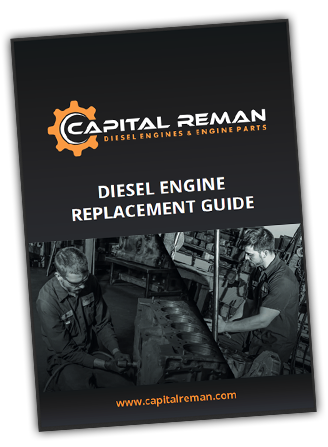Diesel Engine Maintenance Tips
Diesel technology has come on leaps and bounds in recent years from ultra-low sulfur diesel to biodiesel. Gaining DPF filters in order to reduce emissions and high efficient common rail injection systems to achieve the best mile per gallon. Yes, I agree all of these changes are superb if you are taking the necessary steps to ensure your engine always preforms as best as it can. Now, if that last sentence made you feel slightly uneasy due to the fact you were completely unaware of any maintenance you had to do, keep reading.
Diesel Engine Turbochargers
First and foremost, lets tackle the turbocharger. Your turbocharger is a key part when it comes to making your diesel run efficiently. So, if you want to ensure you get longevity and peak performance from your engine, here are a few simple steps you can take to avoid an early and costly demise.
This may be common knowledge to some of you, but always allow your vehicle to idle for a short while. If you usually get in and start hitting the gas as soon as your off then you could be doing some serious damage. The reason you should idle is to allow some time for the oil to reach all the places it needs to be, and the turbo is just one of these.
Oil additives, these are pretty good for turbochargers and oil systems in diesel engines due to the high temperatures these engines can reach. Oil additives will keep the lubrication running at a good level and help the necessary parts keep their health.
Biodiesel, ULSD & Diesel Fuel Additives Fuel has been switching between ULSD and biodiesel. These are the main two you have probably seen at your local gas station. Regardless of which is available, a diesel fuel additive is always a good idea. The purpose of these additives is to ensure your injectors are working properly with a nice even spray pattern.
Fuel has been switching between ULSD and biodiesel. These are the main two you have probably seen at your local gas station. Regardless of which is available, a diesel fuel additive is always a good idea. The purpose of these additives is to ensure your injectors are working properly with a nice even spray pattern.
Additionally, you should try to find a fuel additive that also demulsifies water. A fair majority of the additives on the market today will actually try to burn the water out via the injection system. So, to make the fuel water separators job a little easier, and find an additive that removes water to give it a little helping hand.
Also, these additives are brilliant for fuel gelling. During the winter months, the last thing you want is your vehicle not to start, so reduce the chances of this by using an additive to rid the chances of it happening.
Diesel Oil and Filter Changes
This is another key to maintaining your diesel engine. Diesel oil changes are a necessity, as I mentioned above, the diesel engine can create large amounts of heat. The engine oil longevity depends on how often the vehicle driven and the conditions of which it is being used. Therefore, it is imperative to follow OEM recommended oil change intervals to ensure your engine is in peak condition.
While engine oil is sometimes considered the only filter people should be concerned about…it’s not. Diesel fuel filters also need to be swapped at certain intervals too. With today’s diesel fuel this is just as important as changing your oil and air filters. So please, prioritise this also.
Diesel Coolant and Additives As I have previously mentioned, diesels are high heat engines. So, I think you knew this was coming…coolants! So for those of you that often walk into a store because you know you need some sort of coolant but are completely clueless and baffled by the plethora of different coolants on the shelf, listen up.
As I have previously mentioned, diesels are high heat engines. So, I think you knew this was coming…coolants! So for those of you that often walk into a store because you know you need some sort of coolant but are completely clueless and baffled by the plethora of different coolants on the shelf, listen up.
Firstly, mixing coolants is a terrible terrible idea, and one of the worst things you could do to an engine, its borderline assault. It can in fact kick off a chemical reaction and leave your cooling system in a bit of a mess. This will create a load of other issues with the worst case scenario being you need a new engine.
Another thing people tend to do (no idea why) is add water. This would only be justified if you were stranded with no means of assistance. The problem with this is that plain water doesn’t actually disperse heat as well as a coolant can, meaning that over time it will cause more problems for you and your engine, especially in the winter. During low temperatures this will mean there is a chance your engine block could crack and freeze, so just don’t, please.
Why is Maintenance Important?
So, apart from ensuring your engine is always operating at a high level, why else is it important to maintain your engine? For a start, you have invented thousands into your vehicle, so it would be a bit silly to not look after it.
Also, extending the life of your engine is in your best interests. By just following a regular schedule, you can keep a load of problems at bay. The last thing you would want is to break down. The one thing more important than your engines safety, is your safety. A break down at night on a quiet road can put you and others in a potentially dangerous situation. Regular maintenance will prevent the chances of break down, ultimately increasing your safety.


 Brian is one of the original
co-founders and owners of Capital Reman. Over Capital Reman’s history, Brian has worked in nearly all aspects of the business &
industry to include sales, technical resolution, partner development, practice/policy development, and core management. Today,
Brian spends most of his time leading and developing business opportunities to further enhance and position Capital Reman as a
leader in the Heavy Duty Diesel Remanufacturing space.
Brian is one of the original
co-founders and owners of Capital Reman. Over Capital Reman’s history, Brian has worked in nearly all aspects of the business &
industry to include sales, technical resolution, partner development, practice/policy development, and core management. Today,
Brian spends most of his time leading and developing business opportunities to further enhance and position Capital Reman as a
leader in the Heavy Duty Diesel Remanufacturing space.

